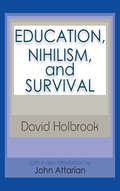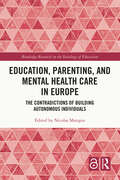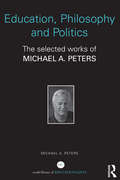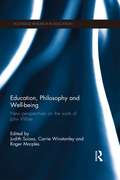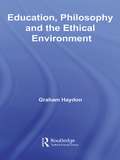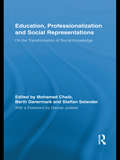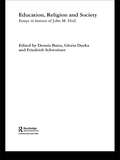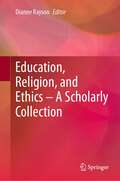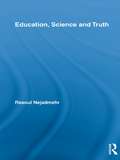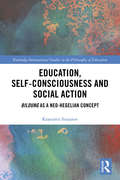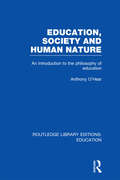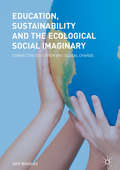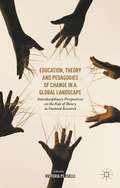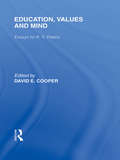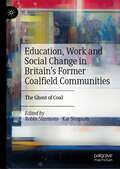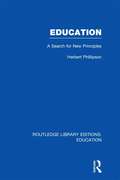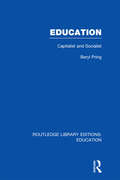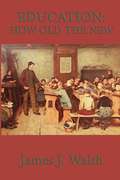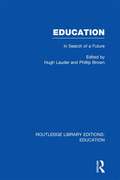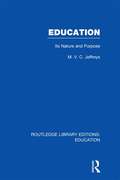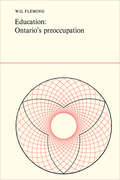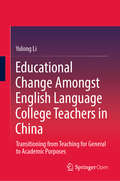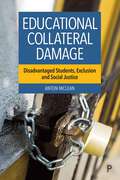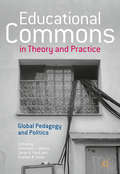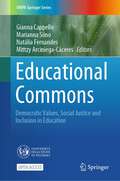- Table View
- List View
Education, Nihilism, and Survival
by Ernest KrauszUnder the influence of science, modern civilization has adopted the view that only things that can be verified empirically or arrived at rationally are true. Modern people tend to regard themselves as mechanisms, without any subjective aspects to their nature. In this insightful and passionately concerned book, British educationist and man of letters David Holbrook retorts persuasively that this reductive view of human nature is profoundly false. Man's inner, subjective life is essential to his nature, what happens to his consciousness is the most important thing in his life, and his greatest need is to find meaning.Holbrook also warns that reductionism has pernicious, even lethal, cultural, social, and political consequences. The logical result is nihilism: if human beings and existence are but physical mechanisms, it necessarily follows that consciousness does not exist, life is meaningless, our concern with moral values is pointless, and so are our lives and actions. Life itself reduces to nothing but self-indulgence and self-assertion. A culture informed by this perspective is necessarily full of expressions of hate and meaninglessness, which coarsens and demoralizes the majority of the population and worsens the mental pathologies of unstable persons. "Egoistical nihilism" becomes ever more widespread, and a decent society becomes impossible.Holbrook advances a keenly insightful and eloquent critique of the radical individualism of Max Stirner's famous tract The Ego and His Own. Stirner's worldview, he argues, is grounded in psychopathology and takes the nihilist assumptions of modernity to their logical conclusion: "the unique one" totally detached from society and reducing others to mere means to his ends, fair game for exploitation unfettered by ethical considerations. Ominously, he notes, the Stirnerean attitude toward existence is becoming increasingly common. Against the reductive perspective of positivism, Holbrook argues that scientific investigations establish the reality of meaning and of values rooted in love. He calls for a reaffirmation of both.Originally published in 1977, Education, Nihilism, and Survival speaks prophetically and even more urgently to us today. The worsening coarseness, nihilism, and brutality of our culture, the partisan fanaticisms and widespread alienation and apathy of our politics, and horrors such as school shootings reveal the consequences of radical individualism.Education, Nihilism, and Survival will be of interest to well-educated general readers concerned at the state of culture and society; educators alarmed at harmful approaches in education; and psychologists and philosophers concerned about existentialism, Stirner's egoist philosophy, and the need for meaningful, philosophical anthropology.
Education, Parenting, and Mental Health Care in Europe: The Contradictions of Building Autonomous Individuals (Routledge Research in the Sociology of Education)
by Nicolas MarquisThis edited collection investigates, from a sociological perspective, what it means to create an autonomous individual through a novel exploration of three central fields of sociology: education, mental health care, and parenting.By linking these three aspects through their contribution to the building of an autonomous child, the volume analyses the intersecting roles of parent, teacher, and caregiver as well as the transformations in identities of child, pupil, and patient to understand the construction and repair of autonomy. Using a comparison of various case studies across Scandinavian, English-speaking, and French-speaking countries, chapters explore why personal autonomy is so important in many societies and demonstrate the conceptual and practical challenges the idea brings. Ultimately, the book provides an innovative contribution to the fields of educational sociology and the philosophy of education, as well as parenting studies and the sociology of mental health by making the case for taking autonomy, and its paradoxes, seriously.This cross-disciplinary volume will be of interest to scholars, researchers, and postgraduate students working in sociology and the philosophy of education, parenting, mental health, and child development more broadly. Those with a focus on the study of individualistic societies will also find the volume of use.
Education, Philosophy and Politics: The Selected Works of Michael A. Peters
by Michael A PetersIn the World Library of Educationalists series, international experts themselves compile career-long collections of what they judge to be their finest pieces - extracts from books, key articles, salient research findings, major theoretical and/practical contributions - so the world can read them in a single manageable volume. Michael A. Peters has spent the last 30 years researching, thinking and writing about some of the key and enduring issues in education. He has contributed over 60 books (authored, co-authored and edited) and 500 articles to the field. In Education, Philosophy and Politics, Michael A. Peters brings together 15 of his key writings in one place, including chapters from his best-selling books and articles from leading journals. Starting with a specially written Introduction, which gives an overview of Michael's career and contextualises his selection, the essays are then arranged thematically to create a pathway of a way of thinking in philosophy of education which is forward looking but takes account of tradition and the past. The subjects of the chapters include; Wittgenstein Studies Philosophical Critique of Modernity French Poststructuralism Jean-Francois Lyotard Foucault & Deleuze Derrida American Pragmatism Rorty Cavell Philosophy and racism Through this book, readers can follow the themes and strands that Michael A. Peters has written about for over three decades and clearly see his important contribution to the field of education.
Education, Philosophy and Well-being: New perspectives on the work of John White (Routledge Research in Education)
by Carrie Winstanley Judith Suissa Roger MarplesJohn White is one of the leading philosophers of education currently working in the Anglophone world. Since first joining the London Institute of Education in 1965, he has made significant contributions to the landscape of the discipline through his teaching, research and numerous publications. His academic work encompasses a broad range of rich philosophical issues, ranging from questions surrounding the child’s mind, through the moral and pedagogical obligations of teachers and schools, to local and national questions of educational policy. In this volume, international contributors address key issues in the philosophy of education, touching on significant contemporary concerns and demonstrating the breadth and influence of John White’s work. Each chapter critically examines, builds on, and pays tribute to John White’s unique contribution, considering how his work has impacted on the discipline of education as we know it today. Topics covered include: policy and the role of philosophy of education liberal education the aims of education moral education leadership. Education, Philosophy and Wellbeing will appeal to postgraduate students and academics in the fields of history, policy, education studies, and philosophy, as well as to policy-makers, educational administrators and teachers.
Education, Philosophy and the Ethical Environment (Foundations and Futures of Education)
by Graham HaydonHow much can we reasonably expect from education? This book, written by a philosopher of education, casts new light on this question by seeing values education, not as a separate activity within schools, but as an aspect of education that both reflects the surrounding climate of values and can help to change it. Graham Haydon argues that all of us – whether as teachers, parents, students or citizens – share in a responsibility for the quality of that ethical environment. He argues that we must ensure that what happens in schools will: enable young people to appreciate the diversity of our ethical environment help them find their way through its complexities contribute to developing a climate of values that is desirable for all. This book shows that values education is too demanding to be left to parents and too important to be entrusted to government initiatives. For teachers engaged in values education, this book brings a fresh perspective to what they are doing, within a realistic view of their responsibilities. For students of education, it shows that practical issues can be illuminated by insights from philosophy.
Education, Professionalization and Social Representations: On the Transformation of Social Knowledge (Routledge International Studies in the Philosophy of Education)
by Mohamed ChaibThis book presents a broad range of research related to how social knowledge is shared, transmitted and transformed in the context of education and professional formation. The chapters of this edited collection reflect different theoretical and empirical approaches to that form of common-sense knowledge called social representations, the theory of which was developed almost a half-century ago by Serge Moscovici. Scholars from various research institutions in Brazil, France and Sweden, spanning a wide variety of disciplines within the social sciences, have contributed chapters that are grouped into three main categories related to education, professionalization and transformation of knowledge. Part I covers theoretical approaches to understanding the transformation of social knowledge from the perspective of social representations. Part II analyzes the impact of the theory of social representations on the transformation of knowledge in the field of education and professional formation. Finally, Part III presents several empirical studies focused on the social and cultural frames that condition the transformation of knowledge. While the book is devoted to education and the emerging field of research on professionalization, it will also appeal to anyone with a general interest in how people acquire their worldviews and how these views influence their actions.
Education, Religion and Society: Essays in Honour of John M. Hull (Routledge Research in Education)
by Gloria Durka Dennis Bates Friedrich SchweitzerEducation, Religion and Society celebrates the career of Professor John Hull, a leading figure in the transformation of religious education in English and Welsh schools, and co-founder of the International Seminar on Religious Education and Values. He has also made major contributions to the theology of disability and the theological critique of the 'money culture'. Leading international scholars join together to offer a critical appreciation of his contribution to religious education and practical theology, and explore the continuing debate about the role of religious education in promoting international understanding, intercultural education and human rights. The contributors also deal with indoctrination, racism and relationship in Christian religious issues, and examine aspects of the theology of social exclusion and disability. This unique book includes a complete list of John Hull's writings up to the beginning of 2005 providing both an excellent introduction to contemporary issues of religious education in the West, and the most complete critical account yet of his work.
Education, Religion, and Ethics – A Scholarly Collection
by Dianne RaysonThis collection draws on research in educational areas displaying best practice pedagogy, theoretical and practical, underpinned by philosophy, empirical science, and neuroscience, among other disciplines. It focusses especially on implications for higher education, school education, professional ethics, and religion. Higher education exploration is on the diminution of the humanities and implications for the range of knowledge needed for future citizenship. The work includes a revisioning of higher education’s purpose, especially the changing role of the doctorate and its examination. The focus on school education takes the same pedagogical lens to humanities and social sciences, examining values education and religious studies. Ethical issues include colonisation and decolonisation, especially around the concept of land and ramifications for intercultural studies. The ethics and practice of teaching about life and death issues in medical education are explored in light of research in dialogic consensus. The religion section includes research on interfaith education, especially concerning Islam, and eco-theological education, especially focussed on climate change. Contributors are academic colleagues or former doctoral students of Terence J. Lovat (University Professor, Australia, UK, and Canada) whose internationally acclaimed research straddles these areas. Many of the contributors hold positions of influence in the academic or professional world, while others bring their newly minted doctoral research to the content.The intended readership includes academics and doctoral students across education, ethics, religion, social studies, ecology, health and medicine, indigenous studies, and international affairs.This collection, published in honour of Emeritus Professor Terence Lovat, provides rich insights into the scope and multidisciplinary depth of his scholarship. A philosopher of education whose main work has centred on curriculum theory and values education and ethics in education, Lovat’s scholarship reminds us that the education of children and young people must be concerned with more than academic attainment. In emphasising education as a holistic and moral endeavour—one involving hearts and minds—Lovat has consistently advocated for the provision of opportunities for young people to extend their horizons beyond the school environment to engage with issues in society that go beyond academic learning. Professor Lovat has also made a major and longstanding contribution to the development of Studies of Religion in schools and to the theology and history of Islam and Islamic Education. In traversing Lovat’s significant and remarkable contributions to education, religion and ethics, and the links between them, this book serves as a testament to a highly esteemed scholar.Associate Professor Deborah Henderson, Queensland University of Technology, Australia
Education, Science and Truth (Routledge International Studies in the Philosophy of Education)
by Rasoul NejadmehrWhat is the main problem of contemporary education? Rasoul Nejadmehr argues that the cardinal problem with education is that it does not have an adequate notion of truth underpinning it. Thinkers mainly tend to veer towards two poles - absolutism and relativism. While a one-sided tendency toward absolutism leads to reified categories of thought and alienation, a tendency toward relativism leads to lack of universality and nihilism. Education, Science and Truth suggests a way out by bridging not only divides between and within analytical and continental philosophy but also those of modernism and postmodernism. By using a range of issues, disciplines and literature, Nejadmehr formulates a new version of the concept of objectivity based on the inclusion of multiple perspectives, including ones from art, philosophy and marginalized groups.
Education, Self-consciousness and Social Action: Bildung as a Neo-Hegelian Concept (Routledge International Studies in the Philosophy of Education)
by Krassimir StojanovEducation, Self-consciousness and Social Action reconstructs the Hegelian concept of education, Bildung, and shows that this concept could serve as a powerful alternative to current psychologist notions of learning. Taking a Hegelian perspective, Stojanov claims that Bildung should be interpreted as growth of mindedness and that such a growth has two central and interrelated components, including the development of self-consciousness toward conceptual self-articulation and the formation of one’s capacity for intelligent social action. The interrelation between the two central components of education implies that learning is transformed into education only when it involves the self-consciousness and the identity of the learner. Since both are grounded in the ethical beliefs and values of the individual, transforming learning into education therefore requires that education also address students’ everyday ethical assumptions, as well as their articulation and conceptualization. This claim has a number of implications for educational policy and pedagogy; one being that learning and teaching in schools are educative only if they have ethical significance for both students and teachers. Another implication is that the point of departure for educative teaching becomes the actual, everyday ethical beliefs and experiences of the students, rather than fixed curricular contents. Students’ encountering with sciences and arts should aim at the conceptual articulation of those beliefs and experiences – an articulation which makes individual’s rational autonomy and self-determination possible. Education, Self-consciousness and Social Action will be of great interest to academics, researchers and postgraduate students interested in the philosophy of education. It should also be essential reading for anyone engaged in the study of Hegel’s work.
Education, Society and Human Nature: An Introduction to the Philosophy of Education (Routledge Library Editions: Education)
by Anthony O'HearIntended primarily for education students this book provides an introduction to the philosophy of education that tackles educational problems and at the same time relates them to the mainstream of philosophical analysis. Among the educational topics the book discusses are the aims of education, the two cultures debate, moral education, equality as an ideal and academic elitism. It examines the limitations of a purely technological education, and suggests the shape of a balanced curriculum. It critically analyses important educational theses in the work of Rousseau, Dewey, R S Peters, P H Hirst, F R Leavis, Ronald Dworkin and G H Bantock, among many others, and considers the philosophical copics of relativism, the nature of knowledge, the basis of moral choice, the value of democracy and the status of religious claims.
Education, Sustainability and the Ecological Social Imaginary: Connective Education And Global Change
by Jeff BucklesThis book analyses the evidence for global change, and suggests that the Earth is going through a profound transformation, caused in large part by human action. Land, oceans, polar regions and the atmosphere are all being deeply affected by the human population's lifestyle: what should the educational response be to these various aspects of global change? To answer this, the values of an ecological response are developed, leading to the notion of an 'Ecological Social Imaginary', which looks at how humans can change their way of living to one that is more in harmony with the planet that they live on and depend upon. To enable this, an ecological form of education, Connective Education, is proposed. This focuses on how the human and natural world can be connected for the benefit of humankind and all living and non-living entities, joining head, hand, heart and spirit to the web of life. It is argued that through Connective Education, a particular type of person is formed: one who is able to take their place in the human and natural world, and in this way truly connect with their planet. The book will be essential reading for those working in the fields of Education and Environmental Studies.
Education, Theory and Pedagogies of Change in a Global Landscape: Interdisciplinary Perspectives On The Role Of Theory In Doctoral Research
by Victoria PerselliEducation, Theory and Pedagogies of Change in a Global Landscape
Education, Values and Mind (International Library of the Philosophy of Education Volume 6): Essays for R. S. Peters
by David CooperR. S. Peters has not only been the major philosopher of education in Britain during second half of the twentieth century, but by common consent, he has transformed the subject and brought it into the mainstream of contemporary philosophy. The ten essays in this book attest to his influence whether by critical examination of his ideas or by original treatment of topics in which has has inspired a new interest.
Education, Work and Social Change in Britain’s Former Coalfield Communities: The Ghost of Coal
by Robin Simmons Kat SimpsonThis edited book presents a range of chapters written by new and established authors, drawing on a range of different perspectives and traditions to critically analyse education, work and social change in the former coalfields. Historically, coal was one of Britain’s major industries, employing over a million men at its peak. But mining was more than an occupation - it was a way of life for those living and working in coalfield communities. Work, leisure, family relations and other dimensions of social life were centred upon the coal industry and its related institutions such as trade unions, working-men’s clubs and welfare institutes. These communities have, however, undergone significant social and economic change over time, not least in terms of the pain and suffering associated with the Great Strike of 1984–85, the successive waves of pit closures which took place thereafter and the eventual demise of the coal industry. The book will be of interest to academics drawing on sociology, social policy, history, geography and other subject disciplines.
Education: A Search For New Principles (Routledge Library Editions: Education)
by Herbert PhillipsonContributing to early debates on nature versus nurture, schools and the social environment, town planning and a free comprehensive education, the author discusses key educational issues against the background of a distintegrating Europe in the midst of war.
Education: Capitalist and Socialist (Routledge Library Editions: Education)
by Beryl PringThis book argues that politics, in the sense of the government of our social structure, holds the key to the resolution of educational problems in the early twentieth century; that the teacher will only be relieved of his or her sense of frustration through government and ultimately socialist action. The author looks at the inequality of British education in the early twentieth century and the failure of capitalist education. She suggests measures to change the situation and discusses the aims and methods of socialist education.
Education: How Old the New
by James J. WalshJames Joseph Walsh, M.D., LL.D., Litt.D., Sc.D. (1865-1942) was an American physician and author, born in New York City. He graduated from Fordham College in 1884 and from the University of Pennsylvania (M.D.) in 1895. After postgraduate work in Paris, Vienna and Berlin he settled in New York.
Education: In Search of A Future (Routledge Library Editions: Education)
by Phillip Brown Hugh LauderWhat unites the contributors to this book is an opposition to Thatcherite policies on education and an agreement upon the need for the development of democracy in education. This volume highlights the importance of an area of neglected theoretical and practical concern: the development of a critique of the philosophy and policies of the new Right, and of credible alternative policies.
Education: Its Nature and Purpose (Routledge Library Editions: Education)
by M VC JeffreysThis book discusses the very nature and purpose of education and provides a foundation upon which more specialized studies in the psychology, history and sociology of education can be based. The book therefore surveys the main problems of human life – the relation of the individual and society, freedom and authority, continuity and change (i.e.growth), and underlying them all, the paradox that aspiration and frustration are continually linked in human experience. The educational implications of these various problems are considered in such a way that the methods as well as the aims of education are discussed.
Education: Ontario's Preoccupation
by W. G. FlemingEducation: Ontario's Preoccupation, a companion to the author's seven-volume series, ONTARIO'S EDUCATIVE SOCIETY, reviews the main highlights of educational development in Ontario, concentrating on interpretation rather than statistics. Written for everyone seriously interested in education, whether specialist or general reader, this volume provides an analysis and overview of the key issues that have arisen in education in the last decade and evaluates the prospects for formal education in the future. Among the topics Professor Fleming discusses in detail in this volume are the role of formal education, the expansion of the educational system, the quest for organizational efficiency, the relationship between the province and the universities, educational agencies outside the formal system, research and development, the financing of education, and the questions of religion and language. Education: Ontario's Preoccupation is indispensable as an introduction to the series ONTARIO'S EDUCATIVE SOCIETY, and provides in one volume a compendium of facts and analysis of the main issues in the province's educational development.
Educational Change Amongst English Language College Teachers in China: Transitioning from Teaching for General to Academic Purposes (Springerbriefs In Education Ser.)
by Yulong LiThis open access book provides anthropological insights into the arduous yet rewarding journeys involved in selected TESOL teachers’ pedagogical transition to teaching English for Academic Purposes (EAP) at universities in Shanghai, the largest metropolitan area in China. Applying a unique combination of ethnography and phenomenology, the book offers innovative new perspectives on teacher education research. Drawing on the latest language education theory, it outlines a practitioner-friendly approach to EAP literacy. Teacher readers will especially benefit from the case studies presented here, which provide role models for teacher change in educational reform, as well as advice on their academic careers. In addition to addressing a timely and important research gap on EAP teachers in non-Western countries, the book is the ideal choice for readers interested in an update on English education in China.
Educational Collateral Damage: Disadvantaged Students, Exclusion and Social Justice
by Anton McLeanWhy do disadvantaged students continue to get a poor deal as they progress through England’s education system? Challenging orthodox thinking about school exclusion, this book powerfully advocates for a fairer education system for disadvantaged students. It argues that the current conceptualisation of ‘exclusion’ – physically removing the student from the school – is insufficient. This approach fails to recognise the layers of exclusion that these students encounter. Students can be excluded within their schools (inner exclusion), not just from school (outer exclusion). Drawing on student experiences of exclusion and the perspectives of senior leaders, including the author who is a Head of School, this book demonstrates how we can create a fairer education system for disadvantaged students.
Educational Commons in Theory and Practice: Global Pedagogy and Politics
by Alexander J. Means Derek R. Ford Graham B. SlaterIn this volume, critical scholars and educational activists explore the intricate dynamics between the enclosure of global commons and radical visions of a common social future that breaks through the logics of privatization, ecological degradation, and dehumanizing social hierarchies in education. In its institutional and informal configurations alike, education has been identified as perhaps the key stake in this struggle. Insisting on the urgency of an education that breaks free of the bonds of enclosure, the essays included in this volume weave together bright threads of radical thought into a vivid tapestry illustrating a critical framework for enacting a global educational commons.
Educational Commons: Democratic Values, Social Justice and Inclusion in Education (UNIPA Springer Series)
by Natália Fernandes Gianna Cappello Marianna Siino Mittzy Arciniega-CáceresThis open access book presents the final findings from the case studies developed within the Horizon 2020 SMOOTH project Educational Spaces. Passing through Enclosures and Reversing Inequalities through Educational Commons. The overall objective of the project was to understand, develop, and accelerate the potential impact of education on reversing inequalities for active social inclusion of children and young people at risk in Europe, through introducing the emergent paradigm of the “commons” as an alternative value and action system in the field of education (preschools, schools, and after-school programs). SMOOTH critically draws out the implications of the commons for refiguring education and for social change in general, on a footing of equality, sharing, participation, togetherness, caring, and freedom. Universities, research laboratories, municipalities, NGOs, museums, and youth organizations, in different European countries, have worked together to achieve the aboveaim involving almost 200 educators and teachers, and 800 children, and providing interesting insights and suggestions on how to implement educational commons in many different educational contexts. The target audience comprises policymakers and education leaders, students from Education and Communication degrees, researchers, and educators from both formal and non-formal educational contexts.
